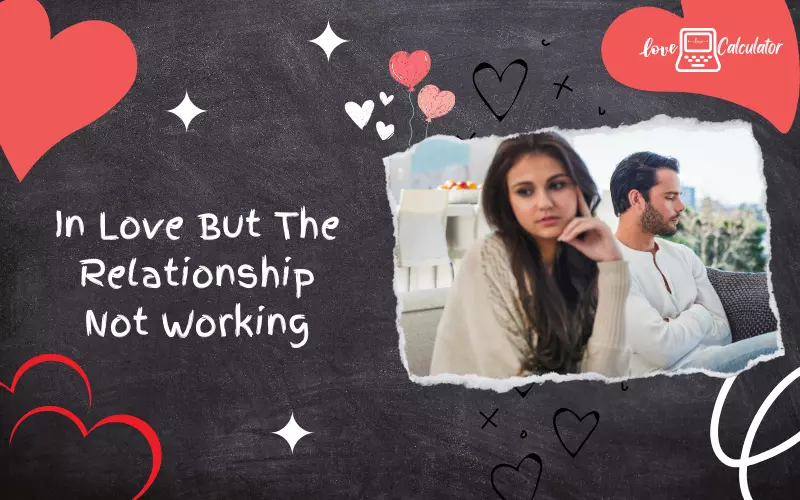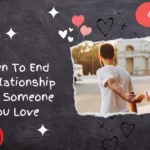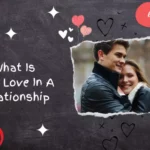Are you feeling the tugs and strains in your once harmonious relationship, even though the love is still there? Relationships can be a rollercoaster of emotions, and sometimes, despite our deepest affection, they hit rough patches. If you’re nodding along, you’re not alone. Many of us have experienced the dilemma of love coexisting with the struggles in a relationship.
In this blog post, we’re here to explore the complexities of loving someone but finding that the relationship isn’t quite working. We’ll delve into common signs, communication pitfalls, and understanding each other’s differences. Relationships require effort, and acknowledging the challenges is the first step towards finding solutions.
To add a bit of fun to the introspection process, we’ve also got a tool for you – our Love Calculator. Are you wondering about the strength of your connection? You can check the percentage of love and compatibility with our calculator. Remember, it’s just for fun, but who knows, it might bring a smile to your face and shed light on the positive aspects of your relationship.
Let’s embark on this journey together – to explore, understand, and, hopefully, find ways to reignite the spark in relationships where love persists despite the hurdles.
Love But Relationship Not Working Meaning
The phrase “love but relationship not working” conveys the situation where individuals are experiencing challenges or difficulties in their romantic relationship despite the presence of love between them. In other words, the emotional bond and affection are still there, but various factors hinder the smooth functioning or success of the relationship.
This situation might involve issues such as communication breakdown, differing values or goals, unmet expectations, conflicts, or other complexities that affect the overall health and satisfaction within the relationship. It implies that love alone may not be sufficient to overcome the obstacles, and additional efforts, understanding, and possibly changes are needed to address the underlying problems.
People facing this scenario often find themselves in a delicate position, needing to navigate the complexities of their relationship, assess whether the challenges can be overcome, and decide on the best course of action for their well-being and the health of the relationship.
In essence, “love but relationship not working” captures the emotional dichotomy of having deep feelings for someone while grappling with the practical and emotional challenges that may be impeding the success of the relationship.
Love But Relationship Not Working Quotes
Here are a few quotes that capture the essence of love in the face of relationship challenges:
- “Sometimes, even though you love someone deeply, the best way to love them is from a distance.”
- “In the book of love, not every chapter is a fairy tale. Some are tough lessons, but each one adds to the story of us.”
- “Love isn’t always perfect. It isn’t a fairy tale or a storybook, and it doesn’t always come easy. Love is about accepting each other’s flaws and growing together.”
- “When the path of love becomes rocky, remember, it’s the same path that leads to growth and understanding.”
- “Love is not just about finding the right person; it’s about working together to become the right couple.”
- “In the dance of love, sometimes two partners step on each other’s toes, but it’s the rhythm they find together that makes it a beautiful dance.”
- “Loving someone doesn’t mean you have to stay if the relationship is toxic. Sometimes, love is letting go for the well-being of both.”
- “Relationships go through seasons. If it feels like winter now, remember that spring is just around the corner.”
- “Love is not measured by how well we get along, but by how we weather the storms together.”
- “When love is true, it survives the storms and blossoms in the sunshine that follows.”
Feel free to use or adapt these quotes for your blog post on “Love But Relationship Not Working.” They can add depth and resonance to the exploration of love in challenging times.
Love but relationship not working psychology.
Navigating the psychology of a love relationship that isn’t working can be complex. Here are some psychological insights into why love alone may not be enough to sustain a relationship:
1. Communication Breakdown
Psychological Perspective: Lack of effective communication can lead to misunderstandings and emotional distance. Unresolved conflicts may contribute to relationship distress.
2. Unmet Expectations
Psychological Perspective: Unrealistic expectations can lead to disappointment. Understanding each other’s needs and managing expectations is crucial for a healthy relationship.
3. Individual Differences
Psychological Perspective: Differences in personality, values, and goals can contribute to conflicts. Acceptance and compromise are vital to finding a balance between individuality and togetherness.
4. Attachment Styles
Psychological Perspective: Attachment styles developed in childhood can impact adult relationships. Insecure attachment may lead to difficulties in trust and emotional intimacy.
5. Fear of Vulnerability
Psychological Perspective: Fear of vulnerability can hinder open communication and emotional connection. Overcoming this fear is essential for building a deeper connection.
6. Cycles of Dysfunction
Psychological Perspective: Patterns of dysfunctional behaviours, such as avoidance or aggression, can create negative cycles. Breaking these patterns may require introspection and external support.
7. Impact of Past Trauma
Psychological Perspective: Past traumas can influence present behaviour. Recognizing and addressing past wounds is crucial for healing and fostering a healthy relationship.
8. Loss of Intimacy
Psychological Perspective: Reduced emotional and physical intimacy may be a result of stress or changing priorities. Rebuilding intimacy requires intentional effort and understanding.
9. Decision-Making Process
Psychological Perspective: Deciding whether to continue or end a relationship involves cognitive processes, emotions, and values. Individuals may need to assess their own well-being and the relationship’s potential for growth.
10. Adaptability and Resilience
Psychological Perspective: A successful relationship requires adaptability and resilience. Individuals and couples who can navigate challenges, learn from experiences, and grow together are more likely to overcome obstacles.
Understanding the psychological dynamics at play in a struggling relationship can be a crucial step toward finding solutions, whether through individual self-reflection or couples therapy. It’s important to recognize that each relationship is unique, and addressing psychological aspects often involves a combination of introspection, communication, and, in some cases, professional guidance.
In Love But Relationship Not Working Reddit
If you’re interested in exploring discussions or seeking advice on the topic of “love but relationship not working” on Reddit, you can visit relevant subreddits where individuals share their experiences, seek advice, and offer support. Here are a few subreddits that might be relevant to your interest:
1. r/relationship_advice
- This subreddit is dedicated to discussing all aspects of relationships. You can find a diverse range of posts related to relationship challenges, and community members often provide advice and support.
2. r/relationships
- Similar to r/relationship_advice, this subreddit focuses on discussions about relationships, including those facing difficulties. Users share their stories, seek advice, and engage in conversations about various relationship issues.
3. r/AskWomenAdvice and r/AskMenAdvice
- These subreddits cater specifically to asking for advice from women or men, respectively. Users often discuss relationship dynamics and seek input on various aspects of romantic connections.
4. r/dating_advice
- If your focus is on dating-related challenges within a relationship, this subreddit can be a helpful resource. It covers a wide range of dating and relationship topics.
5. r/ExNoContact
- For individuals dealing with the aftermath of a breakup or contemplating the end of a relationship, this subreddit provides support and advice on maintaining no contact and moving forward.
Remember to approach these discussions with an open mind and consider seeking professional advice if needed. Reddit communities can offer diverse perspectives and insights, but it’s essential to tailor any advice to your specific situation and needs.
I’m Not Happy In My Relationship But I Love Him
Love is a beautiful feeling, but what happens when you find yourself not as happy as you once were in your relationship? It’s a tough spot to be in, isn’t it? You love him, but something feels off. In this blog post, we’ll explore the common scenario of feeling unhappy while still being in love. Let’s talk about what might be going on and how you can work towards finding joy and contentment in your relationship.
1. Acknowledge Your Feelings
It’s okay to admit that you’re not as happy as you’d like to be. Understanding and recognizing your feelings is the first step towards finding a solution.
2. Communicate Openly
Talk to your partner about what’s on your mind. Communication is key in any relationship, and sharing your feelings can bring you both closer and help find solutions.
3. Identify the Source of Unhappiness
Pinpoint what’s making you unhappy. Is it a specific issue, a lack of connection, or something else? Understanding the root cause can guide you in making positive changes.
4. Focus on the Positives
Reflect on the things you love about your partner and your relationship. Sometimes, rediscovering the positives can help shift the balance towards happiness.
5. Set Realistic Expectations
Ensure your expectations align with reality. No relationship is perfect, and acknowledging imperfections can help you appreciate the genuine aspects of your connection.
6. Prioritize Self-Care
Take care of yourself emotionally and physically. Your well-being is crucial, and a happy you contribute to a healthier relationship.
7. Consider Professional Help
If needed, seeking the assistance of a relationship counsellor or therapist can provide valuable insights and strategies for improving your relationship.
Remember, it’s okay to love someone and still want happiness for yourself. Relationships require effort from both partners, and open communication is the bridge to understanding and positive change. Together, let’s explore the path to rediscovering joy in your relationship.
I Love Him But We Can’t Be Together
Love can be a complex journey, and sometimes, despite our deepest feelings, circumstances arise that keep two people apart. If you find yourself in the challenging situation of loving someone but being unable to be together, you’re not alone. In this blog post, we’ll explore the emotions, the reasons behind the separation, and how to navigate this delicate space where love exists, but the path to togetherness seems elusive.
1. Acknowledge Your Feelings
It’s essential to recognize and accept your emotions. Loving someone from a distance can be tough, but acknowledging your feelings is the first step toward understanding them.
2. Understand the Reasons
Explore the reasons or circumstances that prevent you from being together. Understanding the obstacles can provide clarity and help you make sense of the situation.
3. Find Closure if Possible
If closure is possible, consider having an honest conversation with the person you love. Understanding each other’s perspectives can bring a sense of closure and peace.
4. Focus on Self-Care
Loving someone who can’t be with you is emotionally challenging. Prioritize self-care to nurture your well-being and focus on personal growth.
5. Explore Other Relationships
While maintaining your feelings for this person, consider opening yourself to new connections. Exploring other relationships can provide different perspectives and opportunities for happiness.
6. Treasure the Connection
Cherish the connection you have with the person you love, even if it’s not in the way you envisioned. Value the positive aspects of the relationship and the impact it had on your life.
7. Create Personal Goals
Redirect your energy into personal goals and aspirations. Focusing on self-improvement and pursuing your dreams can bring a sense of fulfilment and purpose.
8. Seek Support from Friends and Family
Share your feelings with trusted friends or family members. Having a support system can offer comfort, understanding, and valuable perspectives.
Remember that loving someone from afar is a valid and brave experience. While the path to being together may be unclear, your journey doesn’t lose its significance. Embrace the love you feel and find solace in the personal growth this unique connection can bring.
This Relationship Is Not Working Quotes
Here are some quotes that capture the sentiment of a relationship that may not be working:
- “Sometimes, love isn’t enough to fix what’s broken.”
- “In the story of us, some chapters are meant to be closed.”
- “Not every love story has a happy ending; sometimes, it’s okay to write a new chapter.”
- “When the pieces don’t fit anymore, it’s okay to let go and find a puzzle that completes you.”
- “The hardest part of walking away is not looking back.”
- “You deserve a love that stays, not one that fades away.”
- “Not every relationship is meant to last a lifetime, but the lessons they teach us are timeless.”
- “Letting go doesn’t mean giving up, but rather accepting that there’s something better waiting for you.”
- “When the music of love turns into a discordant melody, it’s time to change the tune.”
- “A broken relationship is like a shattered mirror; sometimes it’s best to leave the pieces behind and see yourself in a new light.”
Remember, these quotes are meant to reflect the emotions associated with the challenges of a relationship. If you’re going through a tough time, seeking support from friends, family, or a professional can be valuable.
12 Signs that Relationship Is Not Going To Last
Recognizing signs that a relationship may not be sustainable is crucial for making informed decisions about its future. Here are some common signs that a relationship might not last:
1. Communication Breakdown
Persistent communication issues, like frequent misunderstandings and feeling unheard, strain relationships. To improve, initiate honest conversations, practice active listening, and seek clarification. However, if issues persist or efforts to enhance communication falter, it may indicate a need for reevaluation and potentially considering the end of the relationship.
- What You Can Do
Communication breakdowns are common relationship challenges, but there are proactive steps you can take to address them. First and foremost, initiate honest conversations with your partner. Share your feelings, concerns, and perspectives openly, creating a foundation for understanding. Actively listen to your partner to foster mutual respect and empathy, and seek clarification when misunderstandings arise. By taking these steps, you contribute to a healthier communication dynamic.
- When to Break Up:
Despite efforts to improve communication, if persistent issues remain unresolved, it may signal that the relationship is not conducive to positive growth. Feeling consistently unheard or dismissed is another red flag. If there’s a lack of effort from one or both partners to improve communication, it suggests potential stagnation in the relationship, and it might be worth considering a breakup to prioritize individual well-being.
2. Consistent Negativity
When negativity consistently permeates a relationship, it manifests through frequent arguments, criticism, or an overall sense of unhappiness. This prevailing theme can create an unhealthy and toxic environment, affecting the emotional well-being of both partners and hindering the growth of the relationship.
- What to Do:
To address consistent negativity, it’s crucial to open a line of communication. Initiate an honest conversation with your partner, expressing your concerns and feelings. Encourage active listening and seek to understand each other’s perspectives. Couples therapy can provide a neutral space to work through deeper issues, fostering healthier communication and promoting positive change.
- When to Break Up:
Consider the option of breaking up when consistent negativity persists despite sincere efforts to address the issues. If the relationship becomes emotionally draining, with arguments and criticism overshadowing positive moments, it may be a sign that the partnership is detrimental to both individuals’ well-being. Ending the relationship might be a necessary step for personal growth and happiness.
3. Unresolved Conflicts
In a healthy relationship, conflicts arise but are typically resolved through open communication and compromise. However, when conflicts persist without reaching resolutions, they can become sources of tension and resentment, potentially eroding the foundation of the relationship.
- What to Do:
To address unresolved conflicts, prioritize open and honest communication. Create a safe space to express concerns and actively listen to your partner’s perspective. Seek compromise and work towards solutions together. If needed, consider seeking the guidance of a relationship counsellor to facilitate constructive dialogue and resolution.
- When to Break Up:
Consider the possibility of breaking up if conflicts remain persistent and lead to emotional distress. Unresolved conflicts that contribute to a toxic or hostile environment may hinder personal and relational growth. If efforts to resolve issues prove futile, and the relationship becomes more damaging than nurturing, ending it might be a necessary step for both individuals to find healthier paths.
4. Lack of Emotional Intimacy
Emotional intimacy is the deep emotional connection and vulnerability shared between partners. A lack of emotional intimacy can manifest as a sense of emotional distance, an inability to connect on a deeper level, or a feeling of not being understood or supported by one’s partner.
- What to Do:
To address a lack of emotional intimacy, prioritize open and honest communication about feelings and emotions. Create a safe space for vulnerability, expressing needs, and actively listening to your partner. Engage in activities that foster emotional connection, such as shared experiences and quality time together.
- When to Break Up:
Consider the option of breaking up if efforts to build emotional intimacy prove consistently unsuccessful. A persistent lack of emotional connection may lead to feelings of isolation and unfulfillment. If both partners are unable or unwilling to nurture this crucial aspect of the relationship, it may indicate fundamental incompatibility, warranting a reassessment of the partnership.
5. Mismatched Values and Goals
Fundamental differences in values, life goals, or priorities that are not addressed or reconciled can create significant challenges.
- What You Can Do:
Recognizing mismatched values and goals is essential for a healthy relationship. Initiate open and honest conversations about your individual values, life goals, and expectations. Seek compromises where possible and find common ground. Consider whether both partners can adjust or if fundamental differences are irreconcilable.
- When to Break Up:
If fundamental values and life goals remain incompatible, it can lead to persistent conflicts. If efforts to find common ground or compromise prove futile and the differences are substantial, it may be an indication that the relationship is not sustainable. In such cases, considering a breakup might be necessary for long-term happiness.
6. Trust Issues
Trust is the foundation of a strong relationship. Persistent trust issues, such as jealousy, secrecy, or betrayal, can erode the relationship’s stability.
- What You Can Do:
Addressing trust issues requires openness and commitment. Initiate honest conversations about the root causes of mistrust, and actively work on rebuilding trust through transparency and consistent actions. Seek couples counseling if necessary to navigate these challenges together with professional guidance.
- When to Break Up:
Persistent and unresolved trust issues can erode the foundation of a relationship. If efforts to rebuild trust are consistently thwarted or if there’s a lack of commitment to change, it may be a sign that the relationship is not conducive to a healthy and secure connection. In such cases, considering a breakup may be a necessary step for both individuals to find emotional well-being.
7. Feeling Unfulfilled
If one or both partners consistently feel unfulfilled or unsatisfied in the relationship, it may indicate underlying issues that need attention.
- What You Can Do:
If a sense of unfulfillment creeps into your relationship, take time for introspection. Identify specific aspects causing dissatisfaction and communicate openly with your partner. Collaborate on solutions, set new goals, and actively work towards personal and shared fulfillment. Prioritize activities that bring joy and contentment.
- When to Break Up:
Persistent feelings of unfulfillment, despite efforts to address concerns and set new goals, may indicate deeper issues. If both partners find it challenging to achieve personal satisfaction within the relationship, and if attempts at positive change prove unsuccessful, it could be a sign that the relationship may not be conducive to long-term happiness, prompting consideration of a breakup.
8. Lack of Support
A healthy relationship involves mutual support. If one partner consistently feels unsupported or abandoned during challenging times, it can strain the connection.
- What You Can Do:
Initiate open conversations about the need for support in the relationship. Clearly communicate your expectations and encourage your partner to do the same. Explore ways to be more supportive of each other’s goals, dreams, and challenges. Collaboration and understanding are key to fostering a supportive environment.
- When to Break Up:
If a lack of support persists despite open communication and efforts to address the issue, it may indicate a significant emotional disconnect. A relationship should provide a supportive foundation, and if this essential element is consistently absent, it could lead to emotional strain and dissatisfaction. In such cases, considering a breakup might be necessary for both partners to pursue relationships where mutual support is a priority.
9. Different Expectations for the Future
Divergent long-term plans, such as differing views on marriage, children, or lifestyle, can create irreconcilable differences.
- What You Can Do:
Initiate honest conversations about your individual expectations for the future. Discuss long-term goals, family planning, career aspirations, and lifestyle preferences. Seek compromise where possible and explore ways to align your visions. Clear communication and understanding of each other’s perspectives are vital.
- When to Break Up:
Persistent and irreconcilable differences in expectations for the future may lead to ongoing conflicts. If efforts to find common ground prove futile and both partners are unwilling to compromise, it may indicate that the relationship is not sustainable. Considering a breakup may be necessary to allow each individual the freedom to pursue futures aligned with their personal aspirations.
10. Escalating Patterns of Unhealthy Behavior
If there is a pattern of escalating unhealthy behaviours, such as emotional or physical abuse, it’s essential to prioritize safety and well-being.
- What You Can Do:
Confronting escalating unhealthy behaviors is crucial. Initiate open conversations about concerns and express the need for positive change. Establish clear boundaries and seek professional help if necessary. Both partners should commit to addressing the root causes and actively work towards fostering a healthier relationship dynamic.
- When to Break Up:
If unhealthy behaviors continue to escalate despite efforts to address them, it poses a serious threat to the well-being of both individuals. If there’s a lack of genuine commitment to change or if the behaviors become harmful, it may be a clear indication that the relationship is not conducive to a safe and positive environment. In such cases, considering a breakup becomes essential for personal safety and emotional well-being.
11. Loss of Physical Intimacy
A significant decrease in physical intimacy or a lack of interest in maintaining a romantic connection can be a sign of emotional distance.
- What You Can Do:
Initiate open and non-judgmental communication about the changes in physical intimacy. Discuss feelings, desires, and any factors contributing to the shift. Create a safe space for vulnerability and consider seeking professional guidance, such as couples therapy, to address underlying issues and rediscover emotional and physical connection.
- When to Break Up:
A persistent and unaddressed loss of physical intimacy can strain the emotional connection. If efforts to reignite intimacy prove unsuccessful, and both partners are unfulfilled in this aspect of the relationship, it may be a sign that the relationship is not meeting essential needs. In such cases, considering a breakup might be necessary to allow both individuals the opportunity for relationships that fulfill their emotional and physical requirements.
12. Avoidance of Conflict Resolution
Consistent avoidance of addressing issues or a refusal to engage in constructive problem-solving can lead to an accumulation of unresolved problems.
- What You Can Do
Initiate open discussions about the avoidance of conflict resolution. Encourage a safe space for expressing concerns and ensure both partners feel heard. Practice active listening, seek compromise, and consider couples therapy to improve conflict resolution skills and address underlying issues.
- When to Break Up
Persistent avoidance of conflict resolution may lead to the accumulation of unresolved issues, fostering resentment and distance. If one or both partners consistently avoid addressing conflicts and the relationship becomes a source of continuous stress, it may be an indication that the relationship is not conducive to healthy communication and growth. Considering a breakup may become necessary for the well-being of both individuals.
It’s important to note that every relationship is unique, and these signs may not apply universally. However, recognizing and addressing these signs early on can provide an opportunity for growth or, if necessary, a more amicable parting of ways. If you’re experiencing concerns in your relationship, consider seeking the guidance of a relationship counsellor or therapist to explore potential solutions.
Conclusion
In the intricate tapestry of love and relationships, acknowledging when the threads begin to unravel is a courageous step towards personal growth and fulfilment. As we conclude our exploration of loving someone when the relationship isn’t working, it’s essential to recognize that the journey to lasting happiness may not always follow the expected path. Whether it’s communication barriers, unmet expectations, or fundamental differences, facing the truth about a struggling relationship is an act of self-love.
Remember, it’s okay to prioritize your well-being and seek a relationship that nurtures both partners. Embrace the lessons learned, cherish the positive moments, and consider the growth potential, either together or on separate paths. While love calculators offer a playful glimpse into the dynamics of our connections, they can’t replace the depth of understanding and communication required in real relationships.
As you navigate the complexities of love, trust your instincts and be open to the possibility that the chapters of your love story may take unexpected turns. Your happiness is a worthy pursuit, and the courage to make difficult decisions is a testament to your resilience. Whether rekindling the flame or gracefully parting ways, the journey continues, and the next chapter holds the promise of new beginnings and self-discovery.
FAQ’s
Can you love someone, but the relationship doesn’t work?
Yes, it’s possible to love someone deeply while facing challenges in the relationship. Love alone may not always guarantee a successful and fulfilling partnership.
What do you do when the relationship is not working?
Assess the issues, communicate openly with your partner, seek professional advice, and consider whether the relationship can be improved through mutual effort and understanding.
Can a relationship without love work?
A relationship without love may function on practical terms, but it might lack emotional fulfilment. Whether it can work depends on individual priorities and expectations.
What do you do if you love someone but it’s not working?
Reflect on the reasons for the challenges, communicate openly, consider seeking professional guidance, and decide whether the issues can be addressed or if it’s healthier to move on.
What is a sexless relationship called?
A relationship without sexual intimacy is often referred to as a “sexless relationship.”
Why stay in a loveless relationship?
People may stay in loveless relationships for various reasons, such as fear of change, societal expectations, or a sense of obligation. It’s important to assess one’s priorities and well-being.
How do I know I’m really in love?
Signs of being in love include an emotional solid connection, prioritizing your partner’s well-being, feeling a sense of completeness, and experiencing joy in their happiness.
How do I know if I’m in love?
You may be in love if you feel a deep emotional connection, think about the person often, prioritize their happiness, and experience a sense of fulfilment in the relationship.
Why can’t I end my relationship?
Ending a relationship can be difficult due to emotional attachment, fear of loneliness, or concerns about the other person’s well-being. Seeking support and reflection may help in making a decision.
When to end a relationship?
Consider ending a relationship if there is persistent unhappiness, a lack of resolution to significant issues, or if personal growth is hindered. Trust your instincts and prioritize your well-being.
How to restart a relationship?
Restart a relationship by openly communicating, addressing past issues, setting new goals, and prioritizing mutual growth. Seeking couples therapy may also be helpful.
What are the 5 steps to fix a relationship?
Identify issues, communicate openly, seek compromise, prioritize each other’s needs, and consider professional help if needed.
What is the 5 5 5 rule in relationships?
The 5 5 5 rule suggests that if it’s not going to matter in 5 years, don’t spend more than 5 minutes upset about it.
Can a damaged relationship be repaired?
Yes, a damaged relationship can often be repaired with effort, communication, and commitment from both partners.
How do you end a serious relationship?
End a severe relationship with honesty, clarity, and empathy. Choose a private and calm setting, and be prepared for an emotional conversation.








